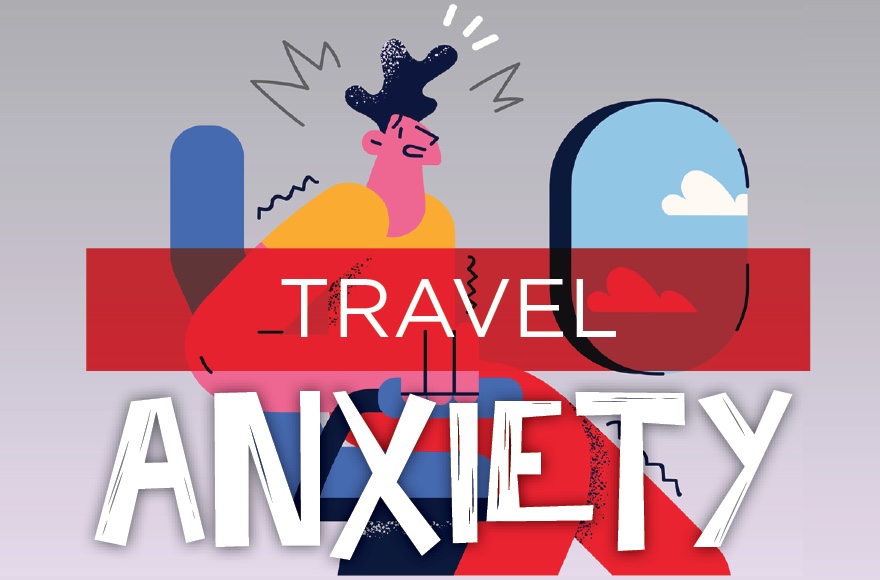Travel Anxiety
Many of us avid travellers create a travel bucket list filled to the top with inspiring and exciting adventures we dream of experiencing one day.
Unfamiliarity can make us anxious. And this is especially true during travel since its very nature is about exploring new and unfamiliar places.
From the shock of unknown places and cultures (including those that use a different language from your own) to busy airports, jet lag, tourist crowds or unread work emails at home – travel anxiety strikes us all in different ways – at any time.
It is impossible to soak in the wonders of a travel destination when our mind is racing. Many individuals find the mere thought of traveling incredibly stressful.
Travel anxiety coincides with the conventional meaning of anxiety, which is described as chronic and sustained worry that is significant enough to impact your daily life. But in this case, it is explicitly sparked by travelling.
People can experience travel anxiety in response to different triggers, but the symptoms can be similar to those of general anxiety and may include changes in sleep and eating patterns, mood changes, racing heart, sweating, and feelings of being out of control.
Prepare for your trip as much as possible
Anxiety is frequently brought on by feeling uncertain or not being in control of a situation, which is why it’s essential to prepare for your trip as much as you possibly can before hitting the road. For anxiety specific to travel, taking small steps to prepare as much as possible in advance can help lessen the severity of your symptoms and help you cope more easily. If you are catching a flight, try to allow plenty of time to get to the airport so you aren’t feeling rushed, for example, and look up your terminal in advance. If you are staying at a new hotel, reach out to them in advance and ask if there is anything you should know before traveling or anything you should be aware of before check-in.
Try strategies to relax your mind
Our mental health practices are still effective abroad. Whatever your favourites are: breathing exercises, meditation, saying positive affirmations, online therapy or simply doing something you love each day (like running, taking photos, reading a book or listening to music) – it is essential to make time for your mind to keep travel anxiety at bay.
Distracting yourself works wonders
Something as simple as distracting yourself while traveling can really help. Having some of your favourite activities on hand can feel comforting if you are experiencing anxiety while travelling. Bringing a favourite book or audiobook, or turning to a favourite mobile game, can help to distract you during a flight or in a car.
When you get to your travel point, try to incorporate a few tasks that are part of your daily routine. Doing so may help you feel more comfortable and way less stressed. This can include taking an early morning run or walk, meditating, journalling, or stretching it out with some yoga.
Visualise your travel
destination
Whether it is sipping piña coladas on a tropical white sand beach, hiking to the top of a mountain, or kicking back by a roaring campfire in the woods, picture yourself having a wonderful time there. Some individuals are triggered with anxiety simply by all the planning and steps it takes to get to their destination.
It might be an airport, train station, a your own car or a rental car, it can feel overwhelming and stress-provoking. The reason why you wanted to travel can be easily forgotten. Visualising yourself outside of the stressful travel experience and safely at your destination can help to calm your nervous system down. Naturally, a chilled glass of fizz or cocktail can also offer calming qualities.
Avoid focusing on worst-case scenarios
It is important to do what brings you comfort and ease. If focusing on a worst-case scenario triggers your stress, consider what would bring you to a level of comfort.
For example, If you are driving a long distance and are afraid of getting lost, maybe look up a few different routes you could take and bring a backup charger for your phone in case of an emergency. If you are worried about being in an unfamiliar area, reach out to loved ones that may have visited where you are going, or join an online travel group or forum that can give you more information and make you feel more at ease. Always have some practical and emotional safety nets to give you a sense of confidence.
Bring Home Comforts
Similarly, bringing home comforts like a favourite pillow or book can help you feel grounded and at ease in a new destination quickly. This will inject familiarity into an unfamiliar setting – and make you feel comfortable enough to immerse yourself in your new culture and surroundings.
Learn relaxation techniques before you leave and use them while you are on your trip. Research shows that mindful meditation can help to significantly reduce anxiety symptoms. Breathing deeply, relaxing your muscles, and grounding yourself can all help you relax and deal with anxiety.
Tips to help overcome anxiety about travelling:
- Identify your triggers
- Plan for certain scenarios
- Plan for responsibilities at home while you’re away
- Bring plenty of distractions
- Practice relaxation
- Travel with friends
- Consider medication
- Find the positives in travelling
Wherever your travels take you, it is important to approach your journey as simply a part of the process. With some positive, measured steps, you can navigate through any potential travel anxieties and have a wonderful, stress free travel experience.














